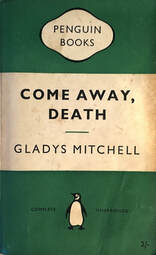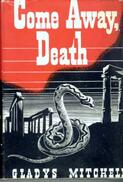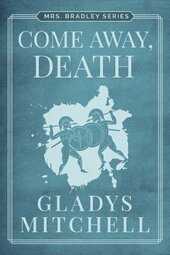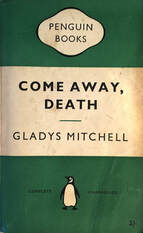
That said, Joyka is a true fan who feels that Gladys Mitchell's writing is usually among the best to be found in Golden Age Detective fiction. I would agree.
Of the journey thus far, Martyn Hobbs has found much to like: "Even in Chapters Six to Ten when the journey felt a little desultory, I have never been frustrated or bored. The whole trip has been a pleasure and the company, if fractious, always entertaining."
APPRECIATING THE TEXT
It is always difficult for me to limit (due to space) the observations I get from Martyn, as he consistently illuminates Gladys Mitchell's style, prose, and techniques in fascinating ways. The best writing rewards close analysis, and "best" isn't always a guarantee in the prose of classic mystery stories. But a closer look – as Martyn offers here – shows Mitchell's carefully deliberate use of imagery, scansion, and characterization. Martyn's summary and examples from the text:
"[Sir Rudri's manservant] Dish, in Chapter Thirteen, the shortest chapter of them all and my personal favourite so far, is shown to be a Man of Mystery and some kind of laconic lowlife Jeeves. In just over two pages, we learn of his free-time habits, observing the ships in the harbour through his telescope; then chartering a small boat to be rowed about by ‘two sweating Greeks’, to be followed up by a possible cinema visit, a drink or two, and a smoke. On this occasion, however, he comes across a boastful bragging Armstrong in a bar, who flings the content of Dish’s glass into his face. There follows a fabulous paragraph almost entirely made up of monosyllabic Anglo-Saxon words and brief, repetitive sentences in which Dish methodically destroys his insulter:"
The ex-A.B. put down the half-empty glass and wiped his face. Then he spat on his hands. Then he hit Armstrong in the belly. When Armstrong got up – and it took him some time to do that – he hit him on the nose and among the teeth. Then he slogged him in the ribs. Then, with his great horned palm, he struck him across the face. To conclude he put his hand across Armstrong’s nostrils and literally pushed him over. Then he sat down and began to drink again, etc. (My bolded italics)
"Jumping ahead to the sea-voyage to Ephesus in Chapter Fifteen, Gladys Mitchell displays her mastery of style, again employing short words and repetition, but in contrast to Dish dishing out the punches, this time her prose is all soft and languid and musical:"
The sea was calm, the islands, like banks of green morning, rose high out of the sea as the ship approached where they lay, and dropped astern in faint and lovely haze as the ship passed gently onwards. (…) They spent all of the second morning leaning over the rail and gazing at the islands, rising in greenness, declining in purple and grey, fading in faint blue far away, beautiful as a former life remembered in this life, or the recollection of an old story once told, and ever afterwards groped for in the golden clouds of the mind.
Once more, readers noted the connection between the aged detective and the young boys who view her as a respected elder and, when needed, reliable protector. Joyka writes that "Mrs Bradley loves small boys. They almost always provide vital clues and important information that other adults might disregard. Stewart’s list of Armstrong’s photographs is a good case in point. Although she doesn’t elaborate, one gets the idea that list is very important to Mrs Bradley."
Martyn notes that "Mrs Bradley has continued to act more as a moral guide and relationship counselor than a detective. That work, we discover, has been undertaken by the kids. Like Emil’s detective mates, we discover that Stewart, Kenneth and Ivor have been doing some serious spying on Armstrong and his photographs."
And Catherine suggests that the drinking game she mentioned regarding the opening chapters – taking a shot each time one of the boys says "You ass" – be amended to include the sleuth's use of the word child, "which Mrs. Bradley uses to refer to everyone from the boys to the middle-aged men."
Next week, the story concludes. Ironically, we will get the murder victim (definitively), investigation, and solution all in the span of five chapters. It is a structural choice that might frustrate some readers and delight others. Until then, I leave you with this quotation from Plutarch on the Mysteries of Eleusis, courtesy of Nick Fuller: "Because of those sacred and faithful promises given in the mysteries... we hold it firmly for an undoubted truth that our soul is incorruptible and immortal. Let us behave ourselves accordingly."




 RSS Feed
RSS Feed